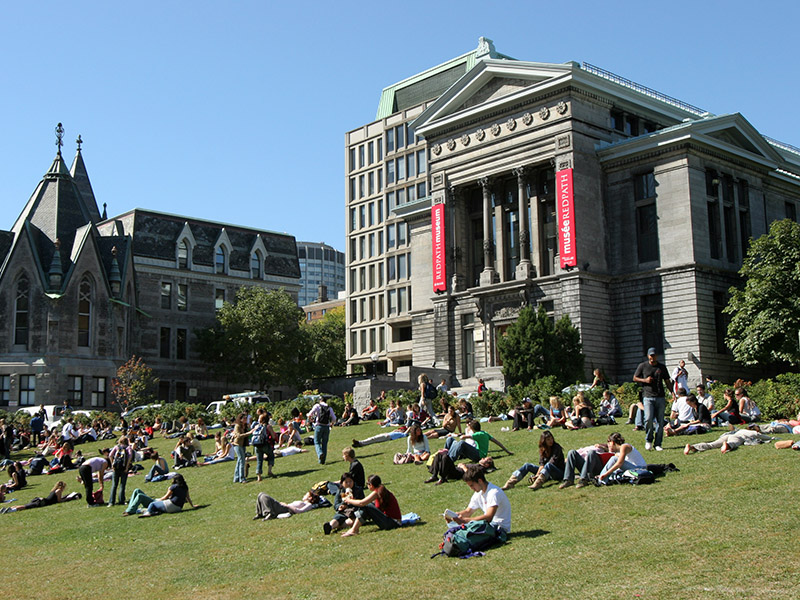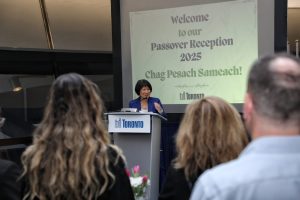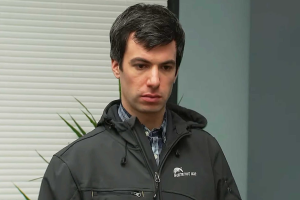No evidence exists that anti-Semitism was the reason why a Jewish student’s bid to be reappointed to the student union board of directors was rejected, an investigation initiated by McGill University has concluded.
Retired education professor and former ombudsperson for students Spencer Boudreau, who conducted the investigation, rejects Noah Lew’s allegation that his candidacy was not ratified at the Students’ Society of McGill University (SSMU) general assembly on Oct. 23 “because I am Jewish and because I have been affiliated with Jewish organizations.”
But Lew’s pro-Israel position clearly was a factor, Boudreau found.
In his report, which was made public on Feb. 6 by McGill principal Suzanne Fortier, Boudreau states: “I can honestly say that my conclusion about this allegation, after what I believe was a thorough investigation of the facts, that is, indisputable evidence, does not substantiate the notion that the vote was motivated by anti-Semitism.”
However, Boudreau did find that Lew’s affiliation with Jewish organizations “that are clearly supportive of the State of Israel” and his approval last year, as a member of the SSMU board of directors, of the SSMU judicial board’s 2016 opinion that pro-BDS motions at general assemblies violate the SSMU constitution, was the reason why students voted against returning him to the board.
READ: MCGILL STUDENTS VOTE ‘YES’ TO ALL SSMU DIRECTORS
Boudreau also said that pro-Israel views were behind the rejection of one of the other students vying for the board at the general assembly.
Boudreau did express empathy for Lew, saying: “Let me state emphatically that Noah Lew’s belief that he was not ratified because he was Jewish was an honest and even understandable reaction to the vote.”
That point was reiterated by Fortier in her reaction to the report, which she received on Dec. 15. She added that the reaction of “members of the broader community, and particularly members of the Jewish community,” was also understandable.
“I would like to take this opportunity to make it clear that there is absolutely no place for anti-Semitism at McGill University and that, as principal and vice-chancellor, I will remain vigilant to ensure that all members of our community feel safe, welcomed and respected on our campuses,” said Fortier.
She commended Boudreau for his “thoughtful and thorough” report.

Boudreau notes that “ad hominem” and “abusive attacks” were made in the days following the assembly, especially on social media, “among both those who agreed and disagreed with” Lew’s allegation, at least one of which contained “anti-Jewish tropes” that contributed to “the explosiveness of the situation.”
Boudreau had the narrow mandate of determining “whether the facts substantiate the allegation of an incident of anti-Semitism,” in connection with the October general assembly, and began his investigation shortly afterward.
In addition to reviewing the videotape and minutes of that meeting and other documentation, Boudreau conducted 38 individual interviews, 32 of which were students who were “central to the events” of Oct. 23. He says he was open to hearing from any McGill student.
“Every single student I interviewed who was not supportive of Noah Lew unequivocally stated that their vote was motivated by politics, that is, it was based on his support for Israel and Zionism and/or his view of the BDS movement,” wrote Boudreau. “I could not, after my research and interviews, present evidence that would equate students’ protests about Israel’s policies with anti-Semitism.”
Lew never actually lost his seat on the SSMU board. Days after the assembly, the SSMU judicial board issued an interim order suspending the vote and, on Dec. 31, handed down a final judgment that splitting the vote at the assembly, rather than ratifying board members in a single bloc vote as has traditionally been done, was contrary to the SSMU constitution.
Indisputable evidence does not substantiate the notion that the vote was motivated by anti-Semitism.
– Spencer Boudreau
In an online referendum in January, more than 84 per cent of undergraduates approved the slate of eight board members, although the turnout was only 18 per cent.
Boudreau makes a plea in his report for debate over the Israeli-Palestinian conflict to be reasoned and respectful, something he sees as lacking.
He says that any student who feels that his or her physical or mental wellbeing is under threat, should seek support through the various options available on campus.
He also urges participation in the Principal’s Task Force on Respect and Inclusion in Campus Life, a second measure that Fortier implemented in response to the Lew controversy.
The task force has conducted a campus-wide survey of students and faculty, held open meetings and is accepting written submissions. It will deliver its report by the end of April, which will include recommendations.
The general assembly vote on Oct. 23 was discriminatory to Jews and pro-Israel students.
– Rabbi Reuben Poupko
Fortier reiterated that the university is “steadfastly against any form of exclusion based on one’s identity.”
Canadian Jewish organizations have rallied behind Lew throughout this experience.
Their reaction to the report varies. The Centre for Israel and Jewish Affairs (CIJA), with which Lew has been most closely affiliated, was muted in its response.
“The general assembly vote on Oct. 23 was discriminatory to Jews and pro-Israel students,” stated CIJA Quebec co-chair Rabbi Reuben Poupko. “While the report strongly validates concerns raised by many, it does not reach a clear conclusion. While the investigation failed to determine anti-Semitic intent, it is clear to us that the targeting of those students was anti-Semitic in effect.”
B’nai Brith Canada said it is “deeply disappointed” that Boudreau found that anti-Semitism was not a motivating factor. The organization feels Lew was the victim of “discriminatory treatment” and not rejected solely for his pro-Israel activism.
“In fact, the students who voted to remove the Jewish director were not merely critics of Israel’s policies, but rather supporters of the BDS movement, which is opposed to the Jewish state’s very existence,” it stated in a press release.
“Unfortunately, rather than seriously grappling with the issue of anti-Semitism at McGill, this report is a whitewash,” said its CEO, Michael Mostyn. “The report does not present a full or accurate picture of the hostile atmosphere facing Jewish students at McGill and inexplicably ignores the common definition of anti-Semitism used in Canada.”
This report is a whitewash.
– Michael Mostyn
“Profound disappointment” was expressed in a joint statement put out by five Jewish organizations at McGill that cite inaccuracies in the report and criticize how the investigation was conducted.
They say the report gets it wrong about when anti-Jewish language was used by the pro-BDS student faction Democratize SSMU.
The organizations say – correctly – that this language was used in the weeks leading up to the assembly, which Democratize SSMU apologized for on Facebook.
“This rhetoric was used to encourage students to vote specifically against Noah Lew. It is under this context that the (assembly) occurred, and the report fundamentally misunderstands this, which alters the entire findings of the report,” reads the statement from Hillel McGill, the McGill Jewish Studies Students’ Association, Am McGill, Chabad at McGill and Jewish Learning Initiative on Campus.
They say that anti-Semitic remarks were made during the assembly, which Boudreau was told, but dismisses in his report.
The report “perpetuates the anti-Semitic notion” that Jewish students involved with outside Jewish organizations are “an acceptable political target,” they state.
Lew could not be immediately reached for comment.






